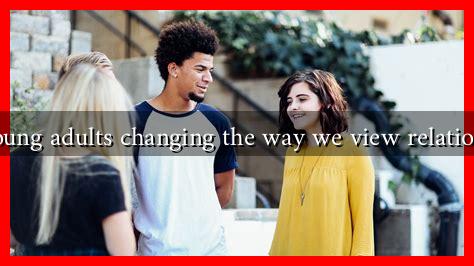-
Table of Contents
Are Young Adults Changing the Way We View Relationships?
In recent years, the landscape of relationships has undergone a significant transformation, largely driven by the behaviors and attitudes of young adults. This demographic, often referred to as Millennials and Generation Z, is redefining traditional notions of love, commitment, and partnership. As they navigate the complexities of modern life, their unique perspectives are reshaping societal norms around relationships.
The Shift in Relationship Dynamics
Young adults today are approaching relationships with a fresh mindset, influenced by various factors including technology, cultural shifts, and changing economic conditions. Here are some key changes observed:
- Delayed Commitment: Many young adults are prioritizing personal development and career advancement over traditional milestones like marriage. According to a Pew Research Center study, the median age for first marriages has risen significantly over the past few decades, with men marrying at an average age of 30 and women at 28.
- Redefining Monogamy: The concept of monogamy is being challenged, with more young adults exploring non-traditional relationship structures such as polyamory and open relationships. A study published in the Journal of Social and Personal Relationships found that 4-5% of adults in the U.S. are currently in consensually non-monogamous relationships.
- Digital Dating: The rise of dating apps has transformed how young adults meet and interact. Platforms like Tinder, Bumble, and Hinge have made it easier to connect with potential partners, but they also contribute to a culture of casual dating and “ghosting,” where individuals abruptly cut off communication.
Technology’s Role in Relationship Evolution
Technology has played a pivotal role in shaping modern relationships. Social media and dating apps have not only changed how young adults meet but also how they communicate and maintain relationships. Here are some notable impacts:
- Instant Communication: Texting and social media allow for constant connectivity, which can enhance intimacy but also lead to misunderstandings and conflicts.
- Curated Identities: Young adults often present idealized versions of themselves online, which can create unrealistic expectations in relationships.
- Access to Diverse Perspectives: Online platforms expose young adults to a variety of relationship models and lifestyles, encouraging them to question traditional norms.
Changing Attitudes Towards Love and Commitment
Young adults are also exhibiting a shift in their attitudes towards love and commitment. Research indicates that they are more likely to prioritize emotional intelligence and compatibility over traditional markers of success in relationships. Key findings include:
- Emphasis on Mental Health: Young adults are increasingly aware of the importance of mental health in relationships. They seek partners who support their emotional well-being and are open to discussing mental health issues.
- Value of Equality: Many young adults advocate for egalitarian relationships, where both partners share responsibilities and decision-making equally. This shift is reflected in the growing acceptance of shared household duties and financial responsibilities.
- Focus on Personal Growth: Young adults often view relationships as a means of personal growth rather than a destination. They are more likely to end relationships that no longer serve their personal development.
Case Studies and Real-Life Examples
Several case studies illustrate how young adults are changing the relationship landscape:
- Couples Therapy: A growing number of young couples are seeking therapy not just for crises but as a proactive measure to strengthen their relationships. This trend highlights a shift towards valuing emotional health.
- Co-Habitation Trends: According to the National Center for Family & Marriage Research, cohabitation before marriage has become the norm for many young adults, reflecting a desire for compatibility testing before making long-term commitments.
Conclusion: The Future of Relationships
As young adults continue to redefine relationships, society must adapt to these changes. The emphasis on personal growth, mental health, and equality in partnerships suggests a future where relationships are more fulfilling and supportive. While traditional views on love and commitment may still hold value, the evolving perspectives of young adults are paving the way for a more inclusive and diverse understanding of relationships.
In summary, young adults are not just changing the way we view relationships; they are challenging us to rethink what it means to connect with others in a rapidly changing world. As we move forward, it will be essential to embrace these shifts and recognize the potential for healthier, more equitable partnerships.
For further insights on relationship dynamics, you can explore resources from the Pew Research Center.

